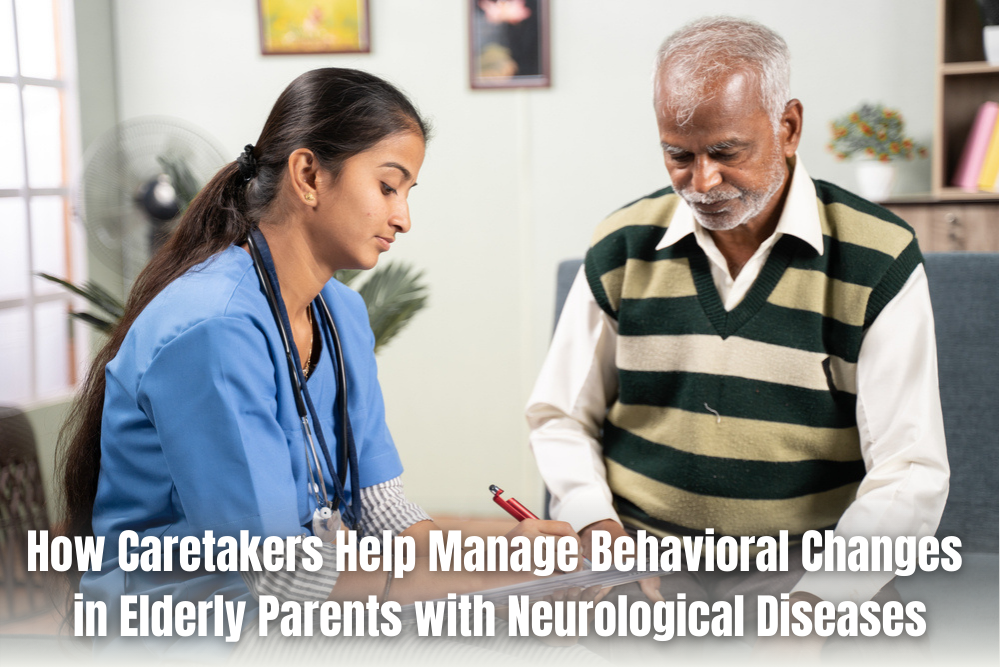When elderly parents suffer from neurological diseases like dementia, Alzheimer’s, Parkinson’s, or stroke, families often notice not just physical weakness but also behavioral and emotional changes. Your once-calm parent may suddenly become anxious, irritable, forgetful, or even aggressive. For family members, this can be heartbreaking and difficult to manage daily.
This article will explain the common behavioral changes in seniors with neurological conditions, and how trained caretakers can help manage these challenges—bringing relief to both patients and families.
Why Behavioral Changes Happen in Neurological Diseases
Neurological diseases affect the brain and nervous system, which control memory, emotions, and behavior. Some common changes include:
- Memory loss or confusion
- Mood swings – sudden anger, irritation, or sadness
- Aggression or restlessness
- Withdrawal from family and social activities
- Anxiety, depression, or fearfulness
These changes are not intentional—they happen because of how the disease impacts the brain.
How Caretakers Help Manage Behavioral Changes
1. Providing Patience and Emotional Support
Caretakers are trained to stay calm and patient, even when seniors show aggression or mood swings. Their gentle approach reduces stress for both the patient and the family.
2. Maintaining a Structured Daily Routine
People with neurological conditions feel safer with routine. Caretakers help maintain fixed schedules for meals, medicines, and rest, reducing confusion and anxiety.
3. Encouraging Safe Activities
Caretakers engage seniors in light activities like walking, listening to music, or simple memory games to keep their mind active and reduce frustration.
4. Handling Aggression or Restlessness
Trained caretakers know how to de-escalate situations using distraction, calm communication, or a change of environment rather than confrontation.
5. Medication Reminders
Missed medicines can worsen behavioral symptoms. Caretakers ensure timely medicines as prescribed by doctors.
6. Companionship and Interaction
Loneliness can increase behavioral issues. Caretakers provide constant company, making seniors feel less isolated.
Benefits for Families
Having a trained caretaker means families don’t have to face these difficult behaviors alone. They get:
- Peace of mind knowing their parent is safe and cared for
- Less emotional stress from daily arguments or struggles
- More quality time to spend with their parent in a loving way rather than always managing problems
FAQs
Q1: Why does my parent with dementia get angry so quickly?
It’s not intentional. Neurological changes in the brain affect emotions, making them more sensitive or easily irritated.
Q2: Can caretakers help with depression or anxiety in seniors?
Yes, while they are not doctors, caretakers provide companionship, emotional comfort, and keep seniors engaged, which helps reduce loneliness and anxiety.
Q3: Should we hire a nurse instead of a caretaker for neurological patients?
If your parents mostly need emotional, daily living, and companionship support, a caretaker is enough. For injections or medical procedures, a nurse is required.
Q4: Can caretakers manage night-time restlessness?
Yes, many caretakers provide 24/7 support and know how to handle “sundowning” (increased confusion at night, common in dementia).
Conclusion
Behavioral changes in elderly parents with neurological diseases can be challenging, but with the right caretaker, they can be managed with patience, structure, and compassion. A trained caretaker not only helps your parent feel safe and supported but also gives your family much-needed relief.
At Shree Swami Samarth Patients Seva, we provide experienced caretakers who specialize in managing seniors with neurological diseases. With us, your loved ones are cared for like family, while you enjoy peace of mind knowing they are in safe hands.


